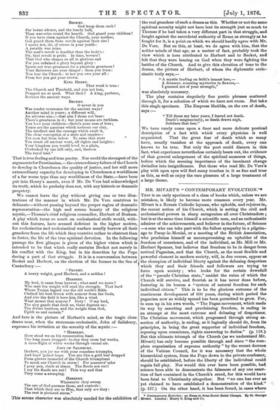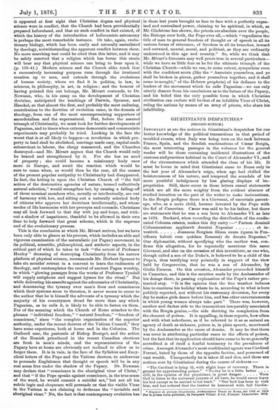MR. MIVART'S " CONTEMPORARY EVOLUTION."* Tins is an early specimen
of a class of books which, unless we are mistaken, is likely to become more common every year. Mr. Mivart is a Roman Catholic layman, who upholds, and rejoices in, the recent action of his Church, which is setting the civil and ecclesiastical powers in sharp antagonism all over Christendom ; but is at the same time himself a scientific man, and an enthusiastic admirer of the achievements, and believer in the future, of Science —a man who can take part with the fullest sympathy in a pilgrim- age to Paray-le-Monial, or a meeting of the British Association, who proclaims himself as uncompromising an upholder of the freedom of conscience, and of the individual, as Mr. Mill or Mr. Herbert Spencer, but believes that freedom to be in danger from revived Paganism, and that the Church, as the most flexible and powerful element in modern society, will, in due course, appear as, the champion of individual liberty against the debasing despotism which they and their friends and followers are trying to force upon society ; who looks for the certain downfall of the "pseudo Christian state," amidst the ruins of which the Church will survive, and flourish as it has never done before, fostering in its bosom a "system of natural freedom for each individual citizen." This is to be the glorious outcome of the continuous development of 600 years, during which period the paganism now so widely spread has been permitted to grow. For, to sum up in his own words, " The Pagan movement, which made its way by asserting and proclaiming freedom, is ending in an attempt at the most extreme and debasing of despotisms. The Christian movement, which progressed through strong as- sertion of authority, is ending, as it logically should do, from its principles, in being the great supporter of individual freedom, reposing upon conscience, rights answering to duties." (p. 119.) But this ultimate triumph of the Church (as we understand Mr.- Mivart) has only become possible through and since "the com- plete organisation of supreme authority" by the recent decrees of the Vatican Council, for it was necessary that the whole hierarchical system, from the Pope down to the private conferisor, should be established, before the liberty of the individual could regain full play. Nor would this ever have been possible, had science been able to demonstrate the falseness of any one asser- tion of fact contained in the Church's creed, for this would have been fatal to Christianity altogether. But "no one has ever as• yet claimed to have established a demonstration of the kind." (p. 137.) On the other hand, it has been found, in cases where-
• Contemporary Braaten: an Buoy on some Recent Social Changes. By St. George- Mivart. London: Henry S. King and Co.
it appeared at first sight that Christian dogma and physical science were in conflict, that the Church had been providentially prepared beforehand, and that no such conflict in fact existed, of which the history of the introduction of heliocentric astronomy is perhaps the most remarkable instance. Or take, again, evolu- tionary biology, which has been easily and naturally assimilated by theology, notwithstanding the apparent conflict between them. No more searching test could be cited than this latter, and it may be safely asserted that a religion which has borne this strain will bear any that physical science can bring to bear upon it. (p. 138-41.) Modern science and the Church alike teach that a successively increasing purpose runs through the irrational creation up to man, and extends through the evolutions of human society, where we find it in politics, in law, in sciences, in philosophy, in art, in religion ; and the honour of having pointed this out belongs, Mr. Mivart contends, to Dr. Newman, who, in his essay on the development of Christian doctrine, anticipated the teachings of Darwin, Spencer, and Haeckel, so that almost the first, and probably the most enduring, contribution to the doctrine of evolution came, in the domain of theology, from one of the most uncompromising supporters of sacerdotalism and the supernatural. But, before the assured triumph of Christianity, we must look for further developments of Paganism, and to times when extreme democratic and communistic experiments may probably be tried. Looking in the face the worst that is at all likely to happen—a revolution in which pro- perty in land shall be abolished, marriage made easy, capital made subservient to labour, the clergy massacred, and the Churches destroyed—and Mr. Mivart argues that the Church would only be braced and strengthened by it. For she has no need of property ; she could become a missionary body once more in Europe, and await the reaction which would be sure to come when, as would then be the case, all the causes of the present popular antipathy to Christianity had disappeared. In fact, the letting in upon the Christian Church of " the full action of the destructive agencies of nature, termed collectively natural selection," would strengthen her, by causing a falling-off of those nominal members who, morally or intellectually, are out of harmony with her, and sifting out a naturally selected body of citizens who approve her doctrines intellectually, and whose modes of life harmonise with her precepts and counsels. Christians may all look forward to that day with joy and hope, and with- out a shadow of impatience, thankful to be allowed in their own time to help forward that great scheme, which is the supreme end of the evolutionary process.
This is the conclusion at which Mr. Mivart arrives, but we have been only able to glance at his process, which includes an able and vigorous examination of the naturalistic (or Pagan) movement, in its political, scientific, philosophical, and aesthetic aspects, in the critical part of which he takes to task "the naivete of Professor Huxley" dreaming of destroying Christianity from his narrow platform of physical science, recommends Mr. Herbert Spencer to take six months' retreat in a convent to learn the rudiments of theology, and contemplates the revival of ancient Pagan worship, in which "glowing passages from the works of Professor Tyndall will supply antiphons and suggest hymns for the ritual." But while delivering his assaults against the adversaries of Christianity, and denouncing the tyranny over men's lives and consciences which their systems seem to threaten, it never seems to occur to the author that he is himself the advocate of a tyranny which the majority of his countrymen dread far more than any which Paganism, as he calls it, is likely to be able to fasten on them. For of the meaning which the Church of Rome attaches to the phrases " individual freedom," " natural freedom," "freedom of conscience," since "the complete organisation of the superior authority, under the recent decrees of the Vatican Council," they have some experience, both at home and in the Colonies. The Guibord case, the pastorals of Bishop Bourget, and the action of the Romish priesthood in the recent Canadian elections are fresh in men's minds, and the representatives of the Papacy here at home are obviously not inclined to allow us to forget them. It is in vain, in the face of the Syllabus and Ency- clical letters of the Pope and the Vatican decrees, to endeavour to persuade Englishmen that thought or speech will be in any real sense free under the shadow of the Papacy. Dr. Newman may declare that " conscience is the aboriginal vicar of Christ," And that " if the Pope speaks against conscience, in the true sense of the word, he would commit a suicidal act," but not all his subtle logic and eloquence will persuade us that the visible Vicar in the Vatican is not claiming to dethrone the "invisible and aboriginal vicar." No, the fact is that contemporary evolution has in these last years brought us face to face with a perfectly organ- ised and centralised power, claiming to be spiritual, in which, as Mr. Gladstone has shown, the priests are absolute over the people, the Bishops over both, the Pope over all,—which "repudiates the title of man to general freedom of thought or of speech in all its various forms of utterance, of freedom in all its branches, inward and outward, mental, moral, and political, as they are ordinarily understood in this age and country." So, while we think that Mr. Mivart's forecasts may well prove true in several particulars— while we have as little fear as he for the ultimate triumph of the Christian Church—while we can, to some extent, sympathise even with the confident scorn (like the " Associate yourselves, and ye shall be broken in pieces, gather yourselves together, and it shall come to nought," of the Hebrew prophets) of his defiance to the leaders of the movement which he calls Paganism—we can only utterly dissent from his conclusions as to the future of the Papacy, and his belief that the only possible form in which Christian civilisation can endure will be that of an infallible Vicar of Christ, ruling the nations by means of an army of priests, who share his infallibility.



































 Previous page
Previous page